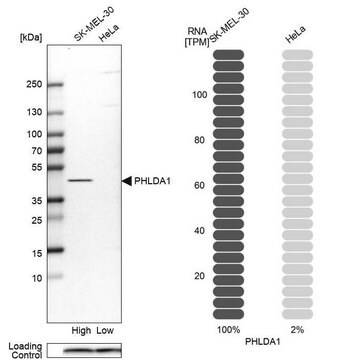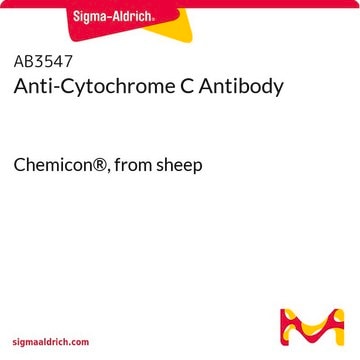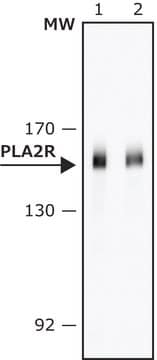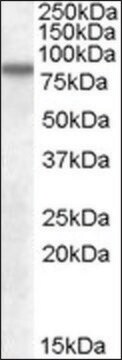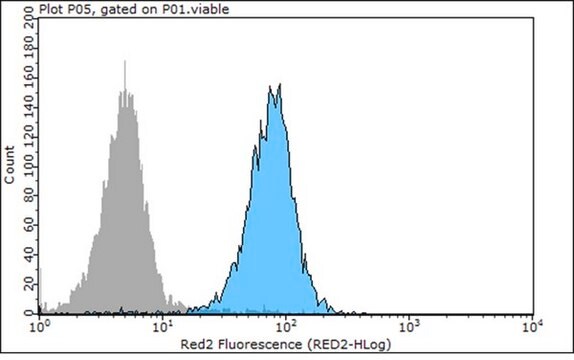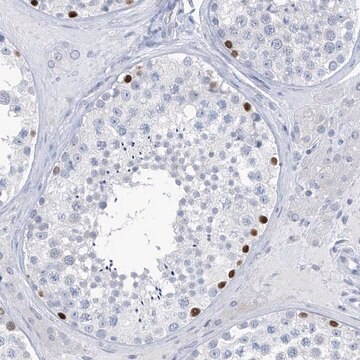推荐产品
生物源
rabbit
共軛
unconjugated
抗體表格
affinity isolated antibody
抗體產品種類
primary antibodies
無性繁殖
polyclonal
產品線
Prestige Antibodies® Powered by Atlas Antibodies
形狀
buffered aqueous glycerol solution
物種活性
human
加強驗證
orthogonal RNAseq
Learn more about Antibody Enhanced Validation
技術
immunofluorescence: 0.25-2 μg/mL
immunohistochemistry: 1:500-1:1000
免疫原序列
MADEELEALRRQRLAELQAKHGDPGDAAQQEAKHREAEMRNSILAQVLDQSARARLSNLALV
UniProt登錄號
運輸包裝
wet ice
儲存溫度
−20°C
目標翻譯後修改
unmodified
基因資訊
human ... PDCD5(9141)
一般說明
The gene programmed cell death-5 (PDCD5) is mapped to human chromosome 19q13.11. The protein is mainly localized in the plasma membrane and the cytoplasm. However, under certain biological conditions PDCD5 relocalizes to the nucleus.
免疫原
Programmed cell death protein 5 recombinant protein epitope signature tag (PrEST)
應用
All Prestige Antibodies Powered by Atlas Antibodies are developed and validated by the Human Protein Atlas (HPA) project and as a result, are supported by the most extensive characterization in the industry.
The Human Protein Atlas project can be subdivided into three efforts: Human Tissue Atlas, Cancer Atlas, and Human Cell Atlas. The antibodies that have been generated in support of the Tissue and Cancer Atlas projects have been tested by immunohistochemistry against hundreds of normal and disease tissues and through the recent efforts of the Human Cell Atlas project, many have been characterized by immunofluorescence to map the human proteome not only at the tissue level but now at the subcellular level. These images and the collection of this vast data set can be viewed on the Human Protein Atlas (HPA) site by clicking on the Image Gallery link. We also provide Prestige Antibodies® protocols and other useful information.
The Human Protein Atlas project can be subdivided into three efforts: Human Tissue Atlas, Cancer Atlas, and Human Cell Atlas. The antibodies that have been generated in support of the Tissue and Cancer Atlas projects have been tested by immunohistochemistry against hundreds of normal and disease tissues and through the recent efforts of the Human Cell Atlas project, many have been characterized by immunofluorescence to map the human proteome not only at the tissue level but now at the subcellular level. These images and the collection of this vast data set can be viewed on the Human Protein Atlas (HPA) site by clicking on the Image Gallery link. We also provide Prestige Antibodies® protocols and other useful information.
生化/生理作用
YY1-associated factor 2 (YAF2) binds and stabilizes programmed cell death-5 (PDCD5), thereby promoting TP53 (Tumor suppressor p53)-mediated apoptosis. In lung A549 cancer cells, DNAJB1 (DnaJ homolog subfamily B member 1) binds and degrades PDCD5 to suppress p53-dependent apoptosis of cancer cells. PDCD5 stimulates promoter activity of KLF9 (Krueppel-like factor 9). Up-regulation of KLF9 inhibits cell proliferation and induces apoptosis in hepatocellular carcinoma cells. PDCD5 is down-regulated in ovarian cancer cells. Absence of PDCD5 is correlated with disease progression and stage in ovarian cancer.
特點和優勢
Prestige Antibodies® are highly characterized and extensively validated antibodies with the added benefit of all available characterization data for each target being accessible via the Human Protein Atlas portal linked just below the product name at the top of this page. The uniqueness and low cross-reactivity of the Prestige Antibodies® to other proteins are due to a thorough selection of antigen regions, affinity purification, and stringent selection. Prestige antigen controls are available for every corresponding Prestige Antibody and can be found in the linkage section.
Every Prestige Antibody is tested in the following ways:
Every Prestige Antibody is tested in the following ways:
- IHC tissue array of 44 normal human tissues and 20 of the most common cancer type tissues.
- Protein array of 364 human recombinant protein fragments.
聯結
Corresponding Antigen APREST74166
外觀
Solution in phosphate-buffered saline, pH 7.2, containing 40% glycerol and 0.02% sodium azide
法律資訊
Prestige Antibodies is a registered trademark of Merck KGaA, Darmstadt, Germany
免責聲明
Unless otherwise stated in our catalog or other company documentation accompanying the product(s), our products are intended for research use only and are not to be used for any other purpose, which includes but is not limited to, unauthorized commercial uses, in vitro diagnostic uses, ex vivo or in vivo therapeutic uses or any type of consumption or application to humans or animals.
未找到合适的产品?
试试我们的产品选型工具.
儲存類別代碼
10 - Combustible liquids
水污染物質分類(WGK)
WGK 1
閃點(°F)
Not applicable
閃點(°C)
Not applicable
Li Gao et al.
Chinese medical journal, 128(8), 1084-1090 (2015-04-18)
Ovarian cancer is a leading gynecological malignancy. We investigated the prognostic value of programmed cell death 5 (PDCD5) in patients with ovarian cancer. Expression levels of PDCD5 mRNA and protein were examined in six ovarian cancer cell lines (SKOV3, CAOV3
Da-Zhi Fu et al.
International journal of oncology, 44(1), 153-160 (2013-11-01)
Liver cancer in men is the fifth most frequently diagnosed cancer worldwide. Human Krüppel-like factor (KLF9) gene, localized on human chromosome 9q13, has been implicated in mediating a diverse range of biological processes including stem cell maintenance and differentiation of
Daniel R Carrasco et al.
Cancer cell, 9(4), 313-325 (2006-04-18)
To identify genetic events underlying the genesis and progression of multiple myeloma (MM), we conducted a high-resolution analysis of recurrent copy number alterations (CNAs) and expression profiles in a collection of MM cell lines and outcome-annotated clinical specimens. Attesting to
Soo-Yeon Park et al.
Biochimica et biophysica acta, 1853(5), 1060-1072 (2015-01-21)
Programmed cell death 5 (PDCD5) plays a crucial role in TP53-mediated apoptosis, but the regulatory mechanism of PDCD5 itself during apoptosis remains obscure. We identified YY1-associated factor 2 (YAF2) as a novel PDCD5-interacting protein in a yeast two-hybrid screen for
Xiandan Cui et al.
Cancer letters, 357(1), 307-315 (2014-12-03)
Although PDCD5 promotes p53-mediated apoptosis in various cancers, little is known about PDCD5 regulation. We recently found that DNAJB1 interacts with PDCD5 and induces the ubiquitin-dependent proteasomal degradation of PDCD5, thereby inhibiting p53-mediated apoptosis. To investigate these novel roles for
我们的科学家团队拥有各种研究领域经验,包括生命科学、材料科学、化学合成、色谱、分析及许多其他领域.
联系技术服务部门
